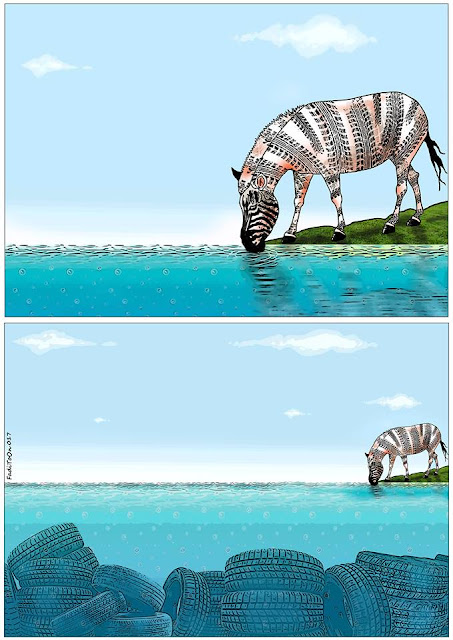The double standards of economical censorship
There is an element of ethnocentrism to the Western support of cartoonists in peril in geographically distant regimes, as Riber Hansson argues.
Riber's pen is as sharp in word as in imagery, in this case on the double standards of economical censorship, which cuts short the livelihood of their own cartoonists, while cultivating a supposed exotic ignorance of papers on other continents.
Riber himself is a compelling paragon of the necessity of cartoonists whatever their geography. The present drawing is from 2011 on humanity standing trial before a mock tribunal at the Kungl. Vetenskapsakademien / The Royal Swedish Academy of Sciences in Stockholm. Without further ado I shall give the word to Riber Hansson, English translation in italics below:
 |
| Riber Hansson, May 18, 2011. |
THE DOUBLE STANDARDS OF
ECONOMICAL CENSORSHIP
BY RIBER HANSSON
Onsdagens DN (30/3) ägnar två helsidor åt att den kenyanske tecknaren Gado har fått sparken. Jag känner Gado, vi har träffats och jag förtvivlar över hans situation. Ändå kan jag inte låta bli att ironisera över DNs reaktion. Jag kan inte påminna mig att det gavs särskilt mycket utrymme i samma blad när tidningens egen Magnus Bard, Sveriges sista anställda satirtecknare, nyligen avskedades från tidningen.
Svenska redaktörer gråter gärna ut över att de politiska cartoonisterna i andra länders tidningar hotas av att inte få sina bilder publicerade. Jag talar inte bara om DN. Indignationen är i pressen som helhet stor över hotet mot satirtecknarna, en harm som verkar öka med de drabbades avstånd till Sverige. Men därborta är det förstås ett utifrån kommande hot som är orsaken till problemet. Svenska mediers tystnad om den svenska tecknade satirens utplånande beror kanske på att det i Sverige är tidningarna själva som undergrävt satirtecknarnas möjlighet att väcka opposition mot massmissbruk, övervåld, och allmän idioti.
Jodå, jag vet att tidningarna av ekonomiska skäl skär ner på personalstyrkan. Och förstår att journalisterna med sin numerära överlägsenhet kan klamra sig fast längre. Jag skulle säkert ha gjort likadant. Men det vore befriande att slippa hyckleriet. Ett alldeles självlysande exempel på detta hymlande förekom efter Charlie Hebdo-debaklet då Publicistklubben hade ett bekymrat samtal om satirteckningens utsatthet. Fantastiskt nog utan att bjuda in en svensk tecknare. Jag ringde till PK och frågade allra ödmjukast om jag kunde få komma dit och närvara, gärna som en tyst mus i ett hörn, men detta var helt uteslutet. Nu sändes ”debatten” på teve så jag missade inget. Det hade jag för övrigt inte heller gjort om jag missat även teveutsändningen.
Det är begripligt om skrivarfolket känner sig hotade av att en 10 cm hög tvåspaltig teckning kan säga hundra gånger mer på några sekunder än en tungläst helsidesartikel. Men kära journalister förtvivla inte och var inte rädda! Vi tecknare är helt beroende av era ord, referat och rapporter, av era analyser och intelligenta slutsatser. Utom förstås, den egendomliga slutsatsen att de politiska satirteckningarnas existens behöver försvaras i alla länder utom Sverige.
Wednesday's Dagens Nyheter (30/3) devotes two spreads to the Kenyan cartoonist Gado being sacked. I know Gado, we have met and I despair of his situation. Yet, I cannot but be ironic regarding the reaction of DN. I cannot recall that much space was given to the sacking of the paper's own Magnus Bard, Sweden's last staff cartoonist, recently dismissed from the newspaper.
Swedish editors are happily bewailing how political cartoonists in other countries' newspapers are under threat of not getting their drawings published. I am not just talking about the DN. The indignation in the press as a whole to the threat against cartoonists is great; a resentment, which seems to increase with the distance of the threatened from Sweden. But way out there it is of course threats from the outside, which are causing the problem. The silence from Swedish media on the extinction of Swedish drawn satire is perhaps due to the fact that in Sweden it is the newspapers themselves that have undermined the cartoonists' right to bring about an opposition to mass abuse, violence, and general idiocy.
Yes, I know that the papers are cutting back on staff for economic reasons. And I understand that the journalists with their numerical superiority can hang in for a longer time. I would certainly have done the same thing. But it would be liberating to be rid of the hypocrisy. A truly luminous example of this goody occurred after the Charlie Hebdo-debacle, when the Press Club had a worried debate on the vulnerability of the drawn satire. Amazingly without inviting a Swedish cartoonist. I called the PK, and humbly asked if I could attend, if need be like a quiet mouse in one corner, but this was completely out of the question. Now, the "debate" was aired on TV, so I did not miss anything. Nor would I if I had missed the broadcast.
It is understandable if writers feel threatened by a 10 cm. high two-column drawing, which can say a hundred times more in seconds than a heavily read the full-page article. But dear journalists, do not despair and do not be afraid! We cartoonists are entirely dependent on your words, abstracts and reports of your analyzes and intelligent conclusions. Except, of course, the strange conclusion that the existence of the political cartoon needs to be defended in all countries but Sweden.
The cartoon shown is courtesy of Riber Hansson and must not be reproduced without his permission.

